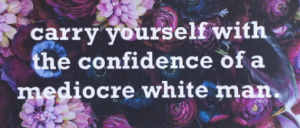I walk down the corridor of my department and find that our recently repainted office doors have each been adorned with a pin-board. As I continue, I observe how these new boards are being used. One door is taken up by the cover of someone’s recent monograph, another is crammed with countless overlapping front pages of journal articles, making them impossible to read, but we get the picture, this person is productive. Some others contain the front pages of the occupant’s latest publications, whilst a handful display teaching awards. I get back to my office and think about what I can put on my door. I don’t have a new publication; my last one was years ago. I don’t even have anything in the pipeline, nothing under review. In fact it’s been well over a year since I’ve written anything at all. There are a couple of revise and resubmits that I’ve left for months and months, unable to respond, tucked away in a ‘publications’ folder that I don’t want to open, that I can’t open. Writing seems like an insurmountable task, so I’ve done nothing. Nothing is all I can seem to do. The times when I’ve tried to sit down and write I just stare at the screen, the process has felt just too overwhelming. No new publications, nothing to see. What can I put on my office door then? Leaving it empty will surely just highlight what I don’t want other people to know: that I’m an academic failure in comparison to my colleagues.
In the end I opt to decorate my door with a single postcard: ‘Heaven is a place where nothing ever happens’ by the artist Nathan Coley. Well, if I’m going to be unproductive I might as well make a statement. Despite publishing since, the postcard remains the only thing on my office door. Nothing ever happens, and the more I think about it, the more heavenly this proposition becomes.
 Photo: Coley, 2008
Photo: Coley, 2008
In this post, I want to reflect upon what these everyday practices of academic display might signify. What could something as seemingly trivial as a pin-board tell us about wider workplace cultures? Over the years, and most recently whilst working on our Athena SWAN[i] submission, I’ve been thinking a lot about workplace culture, especially the microclimates that we all create through our quotidian practices. In particular, I’m interested in the how our everyday acts may serve to uphold a culture of competition, shame and anxiety. Think, for example, of the ways in which over-work has become normalized, even upheld as the sign of a truly committed academic who ‘loves’ their work. And how these messages are then passed on to postgraduate students and early career researchers. In what ways then, have we internalized the logic of the marketized neoliberal university? At times, might we be our own worst enemies? At a conference a few years back I bumped into an acquaintance who I hadn’t seen for almost a year. We were on our way out of a busy session, and so I asked, “what are you doing now?” Without hesitation, they entered into a lengthy monologue about their grants and upcoming publications. By this point I felt unable to clarify that what I actually meant was “what are you doing now, as in right now, are you free, shall we go get coffee?” Though perhaps this was a welcome misunderstanding, as by this point I wasn’t sure if I wanted to drink coffee with this person at all.
What interests me then, is the issue of how we perform our academic selves, and how we might be able to perform them differently. An emerging body of work, particularly amongst feminist scholars, has begun to think about how we might be able to create more caring and nurturing workplaces, examining how a feminist ethics of care might disrupt the drives for ruthless self-sufficiency, competition, over-work and fatigue (Mountz et al, 2015; see also Harriet Hawkins’ blogpost on academic caring as a feminist practice). Such work has argued for the importance of ‘slow scholarship’, slowing down, taking time for thinking, finding connections, caring for ourselves and for each other. The issue of challenging and changing workplace cultures has been integral to many of the conversations we have had whilst taking part in the recent wave of strike action that took place across UK Universities. The strike has made many of us rethink what academia is for, and has reminded us of the importance of connection, of finding solidarity across institutions rather than competition. Currently those taking industrial action are working to contract as part of an action short of strike, this means our working day is 9-5, including taking time out for a lunch break. We are slowing down. For some though, this has been a difficult shift to make, there’s an anxious feeling of somehow missing out, falling behind, as one colleague half-jokingly commented, “while I’ve spent the past 4 weeks on the picket line, all those who aren’t striking have probably polished off another couple of 4 star REF[ii] publications”. The constant pressure to produce and perform can be difficult to escape, even for those in secure academic posts. For those on precarious short-term contracts, such a slowing down may even be an impossibility. Yet it seems vital that we can begin to break this culture of over-work, of over-production, of competition, of self-promotion, and the shame and anxiety that such a culture creates. Not least, because this is a system where those who have other commitments, caring roles, disabilities, chronic illnesses, will never be able to compete on the terms of a masculinist, long-hours, ‘breadwinner’ model. Discussions that have taken place on the picket lines have led to important critical questioning around the toxic yardsticks by which our academic ‘success’ is continuously measured, via frameworks such as REF and TEF[iii]. To mock the absurdity of this all-encompassing audit culture we even developed our own SEF (Strike Excellence Framework) in order to compete for the title of most excellent picket line.
 Photo: SEF Gold for the University of Newcastle
Photo: SEF Gold for the University of Newcastle
Yet to call out the these systems of measurement as arbitrary and destructive is just one step, a much harder part is working out how many of us have also become complicit, how we have internalized the logics of the neoliberal academy. The desire for ‘excellence’ is rarely just driven by an external force. Management provide us with office pin-boards, a space on which we could display anything, poems, art-work, critical comments on the state of higher education, but instead, many of us decide to use this space for self-promotion.[iv] What then, might it mean to resist these everyday displays of complicity? This is not to say, of course, that academics shouldn’t share their work, or engage in conversations about research. What I’m arguing is in fact quite the opposite, a workplace culture where we talk about ideas, writing, projects— without the need to mention funding, places of publication, metrics. Conversations that foster connection rather than competition.
Some may argue however, that this is simply the way the system now is. Publish or perish, self-promote or remain invisible, sell yourself or be overlooked. This is certainly something we’re considering at the moment in regards to our Athena SWAN submission and the relatively low success rates of women going for promotion. To ‘fix’ this issue it appear that the answer is not that we need to change the system or the way the promotions process functions, instead we are told that it is the responsibility of female academics to change. Women are encouraged to attend training courses that will help them ‘succeed’. These courses tell us that we need to self-promote, be more assured and assertive, they tell us how to network, how to use social media to maximize our impact, how to work the room, how to practice our ‘elevator pitches’. What this training boils down to then, is that to be successful you need to emulate the performance of ‘successful’ senior men. But surely we don’t need yet more of this in academia. Perhaps then, as feminist academics, our role is to call out individualized everyday acts of self-promotion and competition, which are so often (albeit not always) a masculine endeavour. Think, for example, of the colleague who feels compelled to tell you the worth of their latest grant to the nearest pound, the one who constantly name-drops his famous advisor, the combative or self-promotional seminar question (I found your talk really interesting, so here’s a ten-minute spiel about my own brilliance). These are displays of insecurity masked as masculine bravado. Call them out, roll your eyes, sigh loudly, do it differently.
 Photo: An inspirational message displayed in my office.
Photo: An inspirational message displayed in my office.
[i] The Athena SWAN charter seeks to advance ‘gender equality in academia’. Members who sign up to the charter are required to apply for Athena SWAN awards which recognise good practice. https://www.ecu.ac.uk/equality-charters/athena-swan/
[ii] The Research Excellence Framework (REF), which assesses the research undertaken in UK Higher Education institutions: measuring the quality of publications and their impact beyond academia.
[iii] The Teaching Excellence Framework (TEF), which attempts to assess the quality of teaching in English Higher Education institutions.
[iv] Though currently many of our office doors are adorned with “Lego VC” posters in support of the strike https://www.flickr.com/photos/followthethings/sets/72157688065608790/
Eleanor Wilkinson is a Lecturer in Human Geography at the University of Southampton.
Contact: e.k.wilkinson@soton.ac.uk